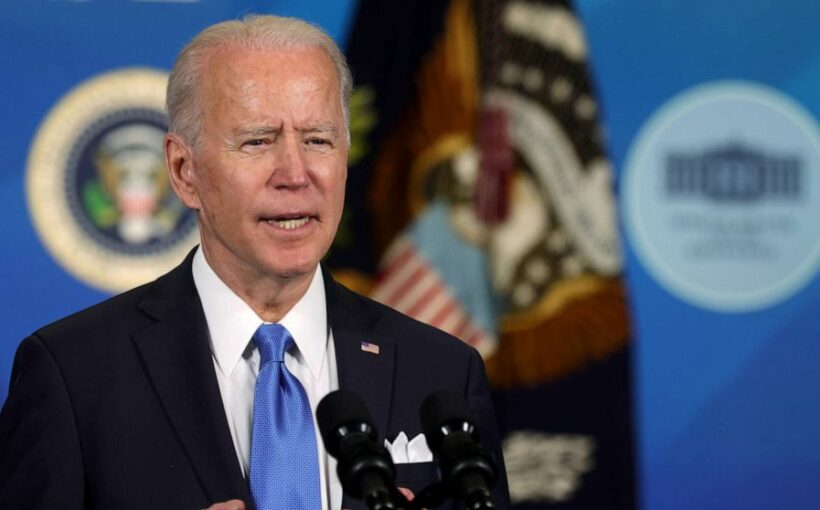The TAKE with Rick Klein
It’s his, and it’s happening. Now the question is what President Joe Biden does to make it all work.
The superlatives and the praise for getting a COVID-19 relief bill essentially as he wanted it will fade, and fast. Starting with Thursday night’s speech — Biden’s first primetime address as president — he starts the task of simultaneously selling the bill and turning it into effective law.
It constitutes a giant bet Democrats are making on themselves about both the resonance of COVID as an urgent issue and public receptiveness to progressive values. The party stood together during the process — embracing an enormous price tag and a range of liberal priorities that are broader than the coronavirus, addressing everything from child poverty to expanding access to Obamacare.
Democrats bear memories of the last time a new president of their party got a major priority approved early on, only to see a conservative revolt cost them Congress the following year.
One takeaway is not to be timid in marking what the new law will do — over and over again.
“It’s not a singular thing — you just pound that nail with that hammer. You just pound it into the wood,” former Obama chief of staff and ABC News contributor Rahm Emanuel said on ABC News’ “Powerhouse Politics” podcast.
Biden is framing his speech Thursday night as a first step in outlining “the next phase of the COVID response.” His hope is that this phase brings an end to the pandemic — and changes some political paradigms along the way.
The RUNDOWN with Averi Harper
After fomenting distrust in mail-in voting and spewing baseless voter fraud claims, former President Donald Trump has voted by mail-in ballot for a municipal election in Florida.
The Palm Beach County Supervisor of Elections website listed the 45th president’s mail ballot as “counted” as of Wednesday evening.
In his first public address since leaving office, Trump continued to slam voting systems and falsely told attendees of the Conservative Political Action Conference that he won the election.
“Had we had a fair election, the results would have been much different,” Trump said last month.
Trump’s use of the very practice he attacked repeatedly on the campaign trail would be of little consequence if his rhetoric hadn’t, in part, spurred Republican lawmakers in 43 states to introduce more than 250 bills to rollback access to the ballot box, according to the Brennan Center for Justice.
Many of these bills have provisions that could limit who is eligible to vote by mail and generally make it more difficult.
In states like Arizona and Georgia, where Trump lost and Republicans control state legislatures, those restrictive actions are inching closer to becoming law which could disenfranchise voters and — disproportionately — voters of color.
The TIP with Meg Cunningham
Stars appear to be setting their sights on roles as lawmakers as predications about who may jump into 2022 races ramp up. Although many voters have found themselves casting a ballot for a celebrity-turned-lawmaker, many who float potential runs don’t make it very far.
In Texas, Matthew McConaughey told the Balanced Voice podcast on Wednesday that running to unseat GOP Gov. Greg Abbott was under “true consideration.” McConaughey has been vocal about what he sees as leadership issues in his home state, and is launching plans to fundraise through his nonprofit youth foundation to benefit Texans impacted by the recent weather crisis.
And in Ohio, where a messy primary is already unfolding to fill the seat left open by retiring GOP Sen. Rob Portman, TV personality and Trump ally Geraldo Rivera floated a bid on Twitter Wednesday. It’s his wife’s home state and where he currently lives, but Rivera got off to a rocky start online after his tweet was geotagged in Siesta Key, Florida.
Trump, who himself used stardom to capture the nation’s attention, waded into the Georgia Senate race by encouraging his friend and former NFL player Hershel Walker to run against Sen. Raphael Warnock, ending his statement with “Run, Herschel, run!”
ONE MORE THING
Despite calls for national unity and bipartisanship, President Joe Biden and his top aides have declined to give the Trump administration credit on the nation’s COVID-19 vaccine rollout while relying heavily on a system established by their predecessors. The public slight appears to have irked the former president, along with his retired aides who told ABC News they are baffled at the political jabs in what was supposed to be a nonpartisan effort to vaccinate America.
THE PLAYLIST
ABC News’ “Start Here” podcast.Thursday morning’s episode features a conversation with traveling nurse Dakoyoia Billie, who tells us what the last year has been like for her treating COVID patients across the country. City of Pasadena public information officer Lisa Derderian tells us how hundreds of ineligible vaccine signups forced the cancellation of a mass vaccination site. And ABC News Political Director Rick Klein breaks down what’s in the House-passed COVID relief bill beyond the $1,400 stimulus checks.http://apple.co/2HPocUL
ABC News’ “Powerhouse Politics” podcast. President Joe Biden has something very big to sell now that the House passed his $1.9 trillion COVID-19 relief package Wednesday. Former Chicago Mayor and ABC News contributor Rahm Emanuel joins ABC News Chief Washington Correspondent Jon Karl and Political Director Rick Klein to talk about what comes next after the bill’s passage. https://bit.ly/3oMKdUP
WHAT YOU NEED TO KNOW TODAY
Download the ABC News app and select “The Note” as an item of interest to receive the day’s sharpest political analysis.
The Note is a daily ABC News feature that highlights the key political moments of the day ahead. Please check back tomorrow for the latest.
Source: Read Full Article
